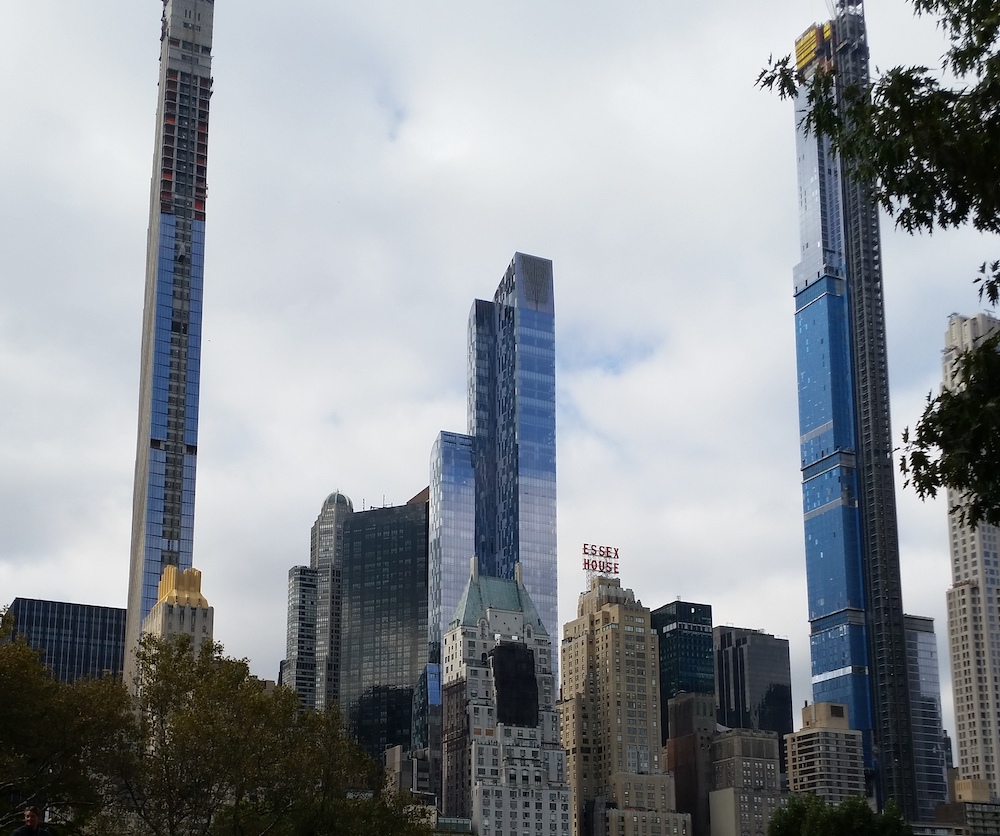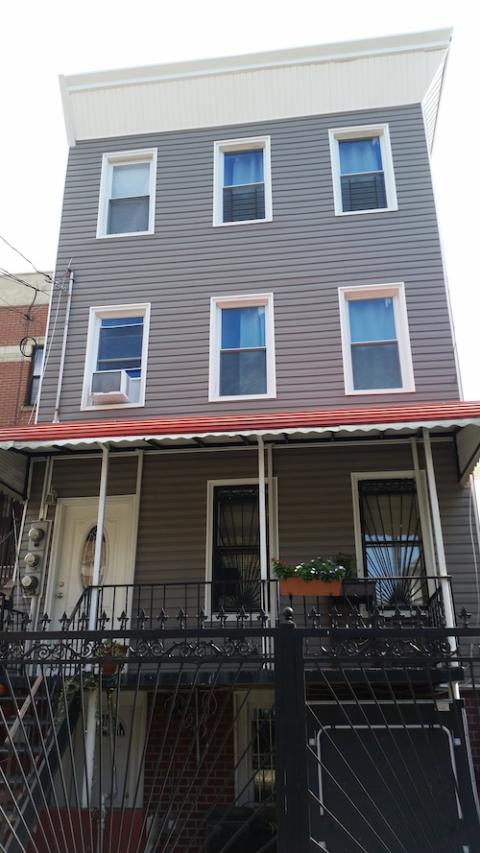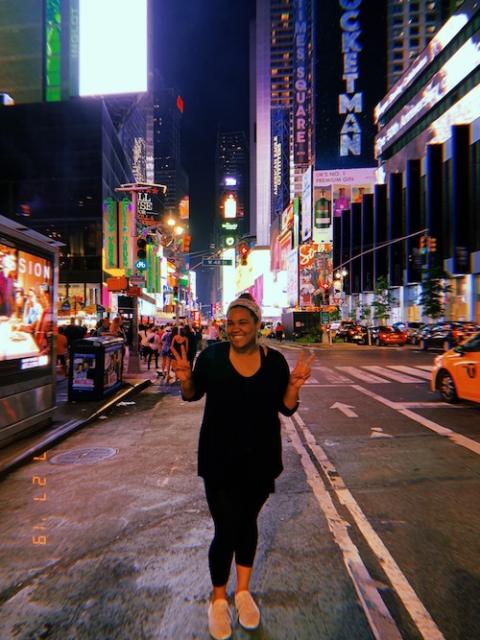
View of new high-rise construction from New York's Central Park (Maria Longo)
Editor's note: Notes from the Field includes reports from young people volunteering in ministries of Catholic sisters. A partnership with Catholic Volunteer Network, the project began in the summer of 2015. This is our 11th round of bloggers: Celine Reinoso is a Loretto Volunteer in El Paso, Texas, and Maria Longo is a Notre Dame AmeriCorps volunteer in the Bronx, New York. This is Maria's first blog post. Read more about her.
Author's note, May 4, 2021: The following entry is the first of eight blog posts I wrote during my time as a missionary in the South Bronx. These subsequent blog entries are my reflections on some of the sorrows and the joys I witnessed in this particular city and community with its own culture and its own triumphs and sufferings, a combination of both physical and spiritual poverty that does not detract from the value of the people living there.
Poverty and suffering are not unique to the Bronx or to any location or group of people. In fact, I would posit that suffering is a universal experience among human beings. Mother Teresa dedicated her life to serving "the poorest of the poor" on the streets of Kolkata (formerly recognized as Calcutta) because she acknowledged the value of those people and the grace such service would bring.
The fact that people are lying in the streets does not revoke those people's value and humanity but is rather a cry to the humanity in others, a call to action for the sake of justice and love. I believe we are all left "lying in the street" at some time or another, in different ways and to varying degrees.
I am so very grateful for the opportunity to live and serve within the community of the South Bronx. The time I spent there has helped to further form me, and I consider it a blessing and a gift. I pray this series may be a call to further love and a light of hope to those who may read it.
Life in the South Bronx is by no means easy. There is a reason so many religious have aggregated here: There is a severe need for their love and service.
Walking over people laid out drunk in the streets on your way to work can be a challenge, especially when none of us has had our morning cereal yet. Drug addicts flock below our windows at night, shooting up heroin. Someone calls the police, the people scramble, and then they come back again.
"Are you going to have a bodyguard?" my uncle asked when I told him where I was moving.
"No," I replied, "but it'll be OK."
I wasn't too sure, myself, but I know, dear city, that time will tell.
The other missionaries and I moved in at the end of a sweltering July and are now seven months deep into life together. It's close quarters with no air conditioning in some places, but we have everything we need.
We Seton Teaching Fellows live in community here, all 27 of us divided between three houses. Because I can't afford daily transit, it's a 20-minute walk every day to Brilla College Prep Elementary, where the other missionaries and I work as classroom and elective teachers, proctors, operations managers, and whatever else the school needs. However, this gives me the opportunity to wade through the trenches in a war that has been waged for centuries. I'm knee-deep in the grime, the filth and the brokenness of humanity. I crawl shoulder-to-shoulder through the streets with the homeless, the sick, the hungry and the despairing. It is a true poverty I see — not just a poverty of body, but also of spirit.

Tinton House is the missionary house where Marie Longo lives. (Maria Longo)
Three weeks into the school year, while walking to the metro station, I passed two women. One woman was screaming to the other hysterically: "Nobody sees me! Nobody loves me! Nobody cares!" I looked at them, and as I passed, the woman met my eyes and said, "Even that girl." Even that girl doesn't love me. Even that girl doesn't see me. Even that girl doesn't care. And I was that girl.
I was struck to the core. I almost stopped dead in my tracks. The sad thing is that I kept walking. By the time I had worked up the courage to go back, introduce myself, ask her to eat dinner with me — just something — I was already on the No. 5 train headed into Manhattan.
That was what I consider to be my first real failure here in the Bronx. I saw a need, but I failed to strive to fill that need, even in my own small capacity.
The moment has stuck with me for some time now, and I continue to pray for her as well as the other people in the community because this is the ground my students tread. These are the faces they see and among which they live. This is the brokenness and the gloom in which they dwell. The muck and scum are what they breathe, and some of them don't even know how to dress themselves and tie their shoes. They reach out with their tiny hands, completely trusting and totally unaware of the darkness that waits for them with teeth bared. If they can stumble across the battlefield and below the subway lines, why can't I? If this is truly the stuff they breathe, why should I not be right there with them in the thick of it? The smog is dense, but we press on together through the dim.
"This isn't just the hood," one of my fellow teachers said with one part anger and two parts pride. "This is my hood."
When reflecting on what I am called to do here with the sisters and brothers in the area, I think back to the scriptural image of the blind leading the blind. How can I possibly lead these children when I myself am so broken? I cannot see what the future holds, and more often than not, I can neither see my own faults nor the graces the Lord has poured into my life. And yet, I know I am not leading blindly — even if I am blind — so long as I am holding the children's hands and the Lord is holding mine, guiding us all.

One of Marie Longo's fellow Seton Teaching Fellows poses during a stroll through Times Square in New York City. (Maria Longo)
During our onboarding, our director impressed one thing in particular upon us: "If you think that this is not for you, you need to tell me now. I cannot give you to the children if you have any uncertainty in your heart," she said sternly. "Because if you leave, for some of them, you will be taking away the only stability they have."
If I in my littleness can carry even just one of these little ones on my back to a brighter place, then it will be enough. Even if I win no souls for Christ, I know and trust that it is my own soul that will be transfigured, because I myself am in such dire need of love.
"I thirst," the Lord speaks to us from the cross, and that is just what these children say to me with their beautiful brown eyes. "Maria, I thirst. Maria, I ache. Maria, I need the love that only you can give me." By the grace of God, I bend and kneel and fold and carry whatever I can. I smile for the children, I cry for the children, I work for the children, and now, I die for the children.
The beginning of this year is just the start of my own march to Calvary. That is the first of the two promises our director made to us, that we would die to self this year. Second, that we would see the face of Christ. I have every confidence I have already seen him again and again and again in single-file lines and eager smiles. May God bless the children he has so generously given to us, and may God bless the hands that hold them.
[Maria Longo serves with the Notre Dame AmeriCorps program in the Bronx, New York.]
Advertisement







